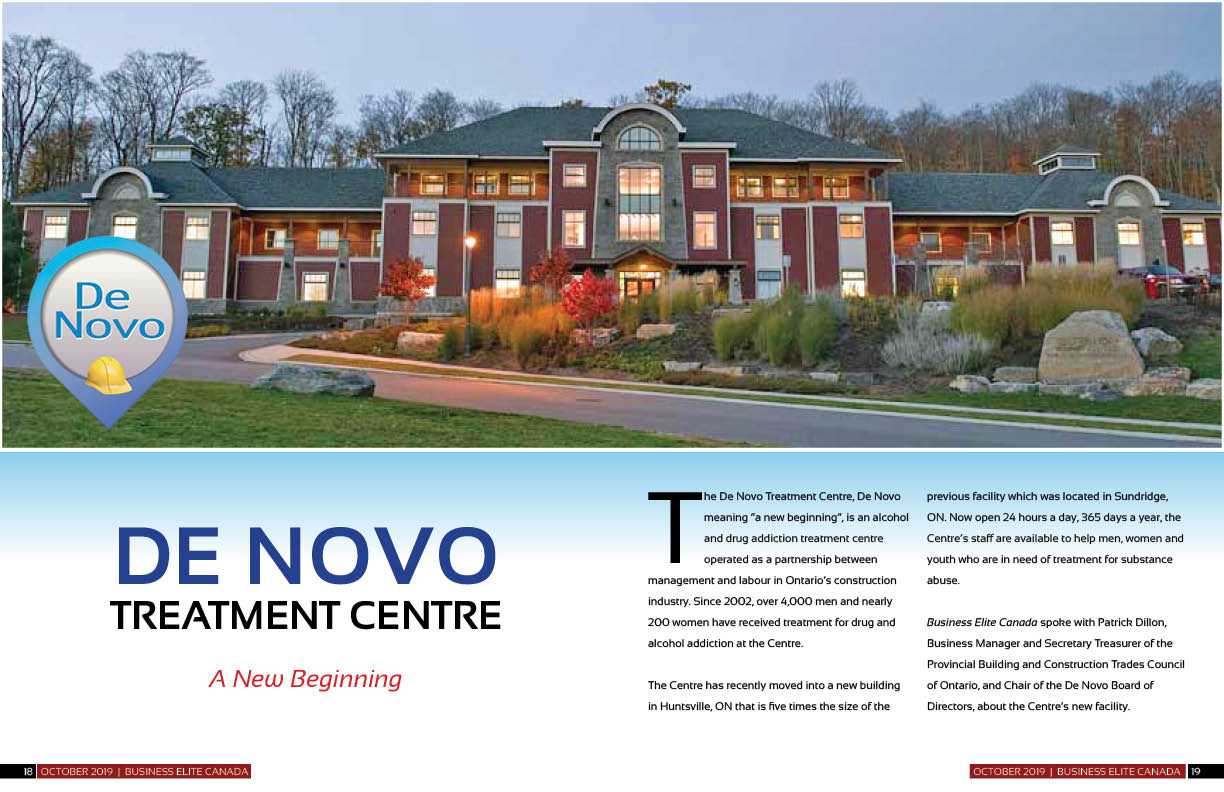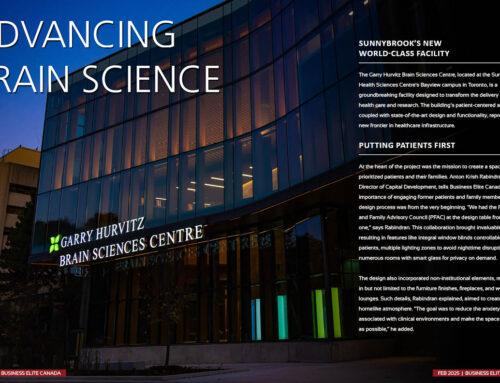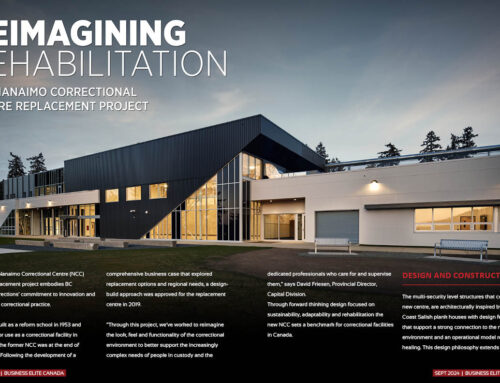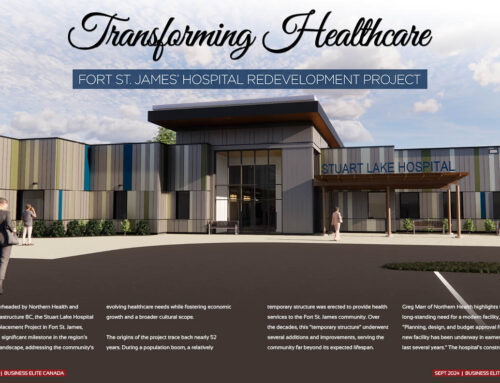A New Beginning
The De Novo Treatment Centre, De Novo meaning “a new beginning”, is an alcohol and drug addiction treatment centre operated as a partnership between management and labour in Ontario’s construction industry. Since 2002, over 4,000 men and nearly 200 women have received treatment for drug and alcohol addiction at the Centre.
The Centre has recently moved into a new building in Huntsville, ON that is five times the size of the previous facility which was located in Sundridge, ON. Now open 24 hours a day, 365 days a year, the Centre’s staff are available to help men, women and youth who are in need of treatment for substance abuse.
Business Elite Canada spoke with Patrick Dillon, Business Manager and Secretary Treasurer of the Provincial Building and Construction Trades Council of Ontario, and Chair of the De Novo Board of Directors, about the Centre’s new facility.
BEC: Please give me an overview of the Provincial Building and Construction Trades Council of Ontario.
Patrick Dillon: The Provincial Building and Construction Trades Council of Ontario was chartered in 1957 with the aim of providing a collective voice on behalf of Ontario’s construction workers. We represent 12 affiliated unions with a total province-wide membership of 150,000 workers across all disciplines of the construction sector.
BEC: What was behind the decision for the PBCTCO to become involved with the health of its members, especially as it pertains to rehabilitation?
PD: In 1991-92, the original union to start the activity that resulted in the De Novo concept was the United Association local 46 in Toronto. As they got into discussions on how to help their members, they realized this was a construction industry issue and they involved other trades, mostly from Toronto. That group realized, I think, that workers from across the province would benefit from assistance so the issue then involved the Provincial Building and Construction Trades Council of Ontario.
The abuse of alcohol and drugs was putting our members at risk. According to the Drug and Alcohol Registry of Treatment (2002), it was reported that:
• Since 1996, Ontario had lost almost 10 per cent of residential addiction treatment beds (from 2003 beds to 1817)
• over 14 per cent of withdrawal management beds (from 627 beds to 535).
In some communities, people must wait as long as:
• 4 months to be assessed for addiction services
• 5 months for admission to a day or evening treatment program
• almost 6 months for admission to a residential service.
The PBCTCO and our employer partners knew that we could do better for our members, and by 2002 the De Novo Treatment Centre had opened in Sundridge, ON with 21 beds for men, with provisions in place to send women to the Renascent and Homewood facilities, as the home in Sundridge could not support a co-ed system.
BEC: What was behind the decision for Ontario’s unionized construction industry to fund the De Novo Centre?
PD: At the time, our Council was looking at how we could help our members. We were reading the data and knew that the wait times for ministry funded beds were unacceptably long. We wanted to help our clients (a) to have access to recovery from a fatal disease, (b) to get them back to work without risk to themselves or the brothers and sisters they worked alongside with, and (c) To be able to do this where the many could help the few members that were in need of help. Hence, the De Novo model was born.
BEC: What precipitated the move to the new centre?
PD: The need of the clients had outgrown the site in Sundridge. With Sundridge at full capacity, De Novo could no longer guarantee its commitment to zero wait-times for clients. In addition to this, the Sundridge site was only available to men, and women were receiving treatment in other centres; Renascent and Homewood. The Board of Directors had been looking to relocate for some time and had made a decision to build on the land in Sundridge, when the Huntsville property became available. A motion was put forward in September 2017, to the full Board and the motion was passed to purchase the Huntsville building and convert it into a rehabilitation facility. The new site is located at 87 Forbes Hill Road in Huntsville, Ontario. It is 35,000 sq. ft. (as opposed to the 7,500 sq. ft. facility in Sundridge). It can accommodate up to 50 co-ed clients.
BEC: Can you give me an anecdote illustration of the good the De Novo Centre has brought to the men and women who have benefited from its services?
PD: Yes, as an example, at the present time we have a client in the house, and his grandfather and father also used the services. The father is still sober after many years. The grandfather has since passed away. The son is now in treatment.
If you look at the statistics, 79 per cent of the clients who use De Novo services are there for the first time. Recently, I had the opportunity to speak at a five-year medallion for a client, who had his family with him. This client was on his way to divorce court and was going to be out of a job. He is now active in the ‘bridging the gap’ part of our program, didn’t get divorced, and his wife comes and speaks at the family program that we facilitate every five weeks. This would not have happened without De Novo.
De Novo is a voluntary program to the clients and it is acknowledged that productivity has been positively impacted in the industry.
BEC: What is the feedback since the opening in January?
PD: 92 per cent of clients stated that they would recommend De Novo to other workers needing assistance.
BEC: What are your goals for the new De Novo Centre?
PD: Our goal is to be an effective, state-of-the-art treatment centre for all of our construction clients who need help. De Novo is an accredited treatment centre, offering 35 days of intensive treatment, with an aftercare program and follow up for one year with ongoing follow up if the clients need or want it. De Novo also has a five-day refresher program for anyone who has gone through the centre and just needs a little help to get over a rough patch.
www.denovo.ca






